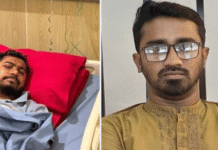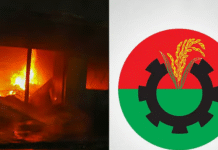Analysts and people alike, everyone realises that the battling camps need to compromise
With both the government and its political opposition sticking to their guns, any hopes of resolving the current crisis have been shot down.
The BNP-led alliance continues to enforce blockade and general strike calling for the ruling Awami League to step down and announce new election.
Prime Minister Sheikh Hasina yesterday brushed aside any possibility of a dialogue with Khaleda Zia’s BNP, reiterating her previous position of not engaging with someone whose hands “smelled of blood and burnt flesh.”
BNP chief Khaleda Zia briefed the media on Friday, after almost two months, only to reiterate her resolve to continue with the anti-government campaign.
This campaign has seen rampant use of petrol bombs as a deterrent for vehicular movement leading to nearly 60 people being burnt to death and hundreds maimed
for lifeå.
Political commentators and general people alike, everyone seems to realise that the parties need to compromise for the impasse to give way.
Having boycotted the last national elections, Khaleda and her allies saw themselves thrown out of parliament while the Awami League, virtually unopposed swept the polls and currently command an overwhelming majority in JS.
After nearly a year of relative peace in politics when the BNP-led camp kept its movement limited within the scope of copybook democratic activities such as rallies and public relations, matters took a turn for the worse on the anniversary of the national polls when BNP was scheduled to observe the “death of democracy” at a rally.
On January 5, 2015, BNP chief Khaleda Zia was prevented by law enforcers from getting out of her Gulshan political office and join that rally.
The next day, the BNP enforced a non-stop countrywide transport blockade, later compounded with general strikes, which enter their 69th day today.
All this time, Khaleda had been holed up in that office, inside the diplomatic zone of Dhaka.
For the first week or so, she was kept in a virtual confinement with security forces barring her several times from coming out. From the middle of January, however, the authorities appeared to be desperate to get her out. Security was relaxed but Khaleda never came out, saying she would stay put as long as her demands were not met.
The ruling Awami League has been saying since the outbreak of violence that it would not cave into terrorists’ demands. The opposition would have to stop violence and only then would the government consider the possibilities of a political dialogue.
In the meantime, there have been numerous attempts from Dhaka-based diplomats and civil society to mediate between the battling camps, but their calls were never heeded by either side.
Analysts say just a bit of will is enough for a thaw. But because both are alienated from the people, they are stuck and so are the people.
According to noted political scientist and researcher Raunaq Jahan, it has become a tradition that leaders have to be uncompromising.
“Both parties think that comprise is a kind of defeat. Since this has become a culture, nobody wants to give ground,” she said.
Political commentator Afsan Chowdhury said: “None is ready to move from their position. They have alienated themselves from the people. So, they are prioritising political agenda instead of people’s interests.”
He also said: “Both parties want to go to power, that is the problem. BNP believes that if there is a fair election, it will go to power. The Awami League on the other hand knows that it will be anyone’s game if a fair election is held.”
General people, who have been bearing the brunt of the political stalemate, also believe that both parties need to make sacrifices.
Mostafa Ahmed, executive at a private company, has a family member who got badly burnt in a petrol bomb attack recently.
“A dialogue can happen any time. But if one of your dear ones get burnt, then you will wonder whether it will be logical to sit in a dialogue with those who are killing people,” Mostafa said.
There are also people who belong to an opposite stream of thought.
“The way BNP leaders are arrested in the country everyday, the prime minister needs to decide what she is going to do to curb violence. We have seen her making all the decisions on her own,” said Mujibur Rahman, a businessman.
Political scientist Mizanur Rahman Shelley said the political parties were egoistic.
“If BNP says it will withdraw its action programmes and if the Awami League agrees to talks, then the problem will be solved just like that. So, the problem basically lies in the attitude of the political parties,” Shelley said.
Source: Dhaka Tribune










